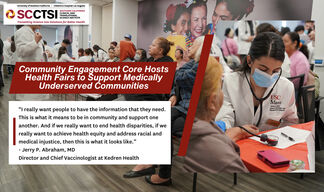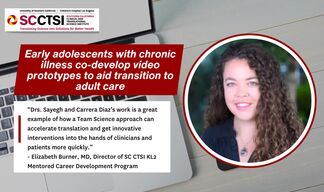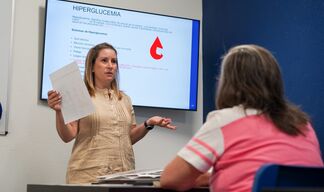SC CTSI Partners with Advocacy Organization to Improve Heart Health among Latinos
Working with local residents who provide culturally relevant health education.
A grass-roots public education model that fielded a cadre of health mentors from two California counties significantly boosted Latino residents' knowledge of everything from cholesterol and diabetes to the importance of nutrition and exercise, according to a study organized by the Southern California Clinical and Translational Science Institute (SC CTSI).
The SC CTSI collaborated in the study with the Keck School of Medicine of USC and Visión y Compromiso, an advocacy organization devoted to improving knowledge and access to health care for California's native-born and immigrant Latino communities. Visión y Compromiso is also one of California's leading proponents of the "promotor" model of community health education.
Promotoras are community members who act as health-oriented helpers and liaisons to their neighbors and communities. They are trained to provide culturally and linguistically relevant health information and help to people within their communities. As members of the community themselves, promotoras are able to leverage personal contacts, trust and respect to address sensitive topics, counter misinformation, and advocate for quality care, according to advocates.
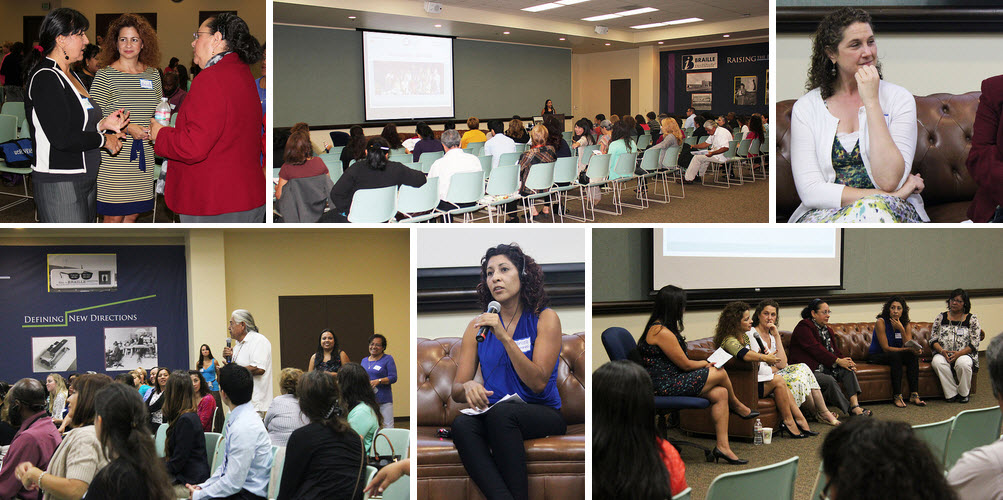
During the SC CTSI project, the study team trained 25 promotoras in a heart-health curriculum called "Su Corazón, Su Vida." The evidence-based curriculum was developed by the NIH's National Heart, Lung, and Blood Institute (NHLBI) to address health disparities in underserved and minority communities.
The promotoras then organized 11-week heart-health courses based on the curriculum, involving Latinos who lived in their communities in urban Los Angeles County and rural Kern County. The study was designed to explore the value of the promotora model in reducing the disproportionately high rates of heart disease and other health concerns among Latinos in those communities.
"We've been excited to take part in this project to show how promotoras can deliver an evidence-based curriculum that makes such an important difference in preventing chronic and serious illness," said Melinda Cordero-Bárzaga, Associate Director of Visión y Compromiso. "Local health care providers and organizations don't generally have the resources to expand their capacity to reach more people in different communities, so the promotora model is an efficient way to fill this critical educational need."
By the time the study was completed, promotoras had engaged a total of 730 residents in the courses, in 49 workshops, between the two counties studied.
"Promotoras bring unique expertise and skill sets that help researchers to create tailored, targeted interventions. This is a great example of an innovative strategy that brings researchers and the community together to improve the health of our diverse community," said Michele Kipke, PhD, co-director of SC CTSI, director of SC CTSI’s Community Engagement.

Michele Kipke, PhD
Based on data gathered through questionnaires administered at the start and completion of the courses, investigators found that residents who took the workshops improved in several areas of lifestyle and health knowledge, such as causes and effects of diabetes, as well as cooking habits and frequency of exercise.
Representatives of the study team from SC CTSI, Keck, and Vision y Compromiso recently reviewed the findings at a community forum in Los Angeles. Present were several promotoras who took part in the study, as well as other promotoras, community health care professionals, other community-based organizations, and clinical researchers from USC.
The promotora model as an efficient way to address critical health education needs
Clinical health research is increasingly focused on improvements in the delivery of health education and health care to underserved groups and communities, said principal investigator Lourdes Baezconde-Garbanati, PhD, professor at the Institute for Health Promotion and Disease Prevention Research, Department of Preventive Medicine in the Keck School of Medicine.
Lourdes Baezconde-Garbanati, PhD
"It's not just public health professionals who can improve health and reduce disparities in communities that aren't adequately served by the existing health delivery structure," said Baezconde-Garbanati. "Promotoras save people's lives and prevent illness because they have access and trust within the community that others don't. I've been in academia 20 years and I don't have the access promotoras have."
The success of the program depended largely on the promotoras themselves, who held workshops at churches, schools, community centers, parks, homes – anywhere they could. "All of the promotoras had to act independently and solve problems on their own," said Victoria Mercel, who served as a promotora in Los Angeles in the study. "It was a mission for us: we know these people and these families, and that is part of the knowledge we draw from."
Promotora Maricela Sanchez, of Bakersfield, in Kern County, conducted many of her workshops in schools and in churches. But because many people in rural Bakersfield work in agriculture, Sanchez also held workshops in the fields, and adapted the schedule to accommodate crop seasons.
"Many times people in the community wait to learn about this kind of information until they're already sick," Sanchez said. "That's why it's so important we get it to them."
To organize the study, the SC CTSI identified the funding mechanism that paid for the project, drafted the grant, brought the team together and provided technical assistance throughout, said Katrina Kubicek, MA, assistant director of SC CTSI Community Engagement. That technical assistance was primarily related to helping the promotoras understand and follow the research protocols to ensure the quality of the data. SC CTSI also conducted some of the data analysis and will collaborate with the study team to draft manuscripts and reports on the project.
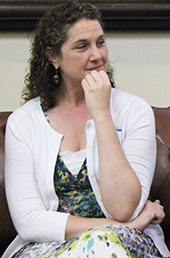
Katrina Kubicek, MA
Building community-academic partnerships to improve research
While improving the health of hard-to-reach populations is the primary goal of the promotora model, Kubicek pointed out that joint community-academic partnerships like the promotora study also benefit the research world.
"The science itself is improved when we promote more diversity in research," said Kubicek. "Studies like this build contacts between academia and communities that have not traditionally been the focus of clinical trials or other research. These partnerships help establish trust between universities and the community, making it easier to conduct translational research."
The promotora project also made a unique and important contribution to the methodology of community-engaged research – an area of strong interest by the National Institutes of Health (NIH) and other public health entities – by engaging the promotoras themselves as part of the research team. Promotoras obtained informed consent, collected de-identified pre- and post-study data, and assisted in data interpretation as members of the advisory board.
The SC CTSI is preparing a white paper for community-engaged researchers, providers and funders that will discuss lessons learned during the project and describe the benefits of integrating promotoras into a research study. The paper will describe the challenges researchers encountered and methods the team developed to address those challenges, in order to prepare other research teams for the types of protocols and training that might be needed to fully leverage the promotora model.
While Visión y Compromiso has focused its efforts on helping Latinos in California, advocates say the promotora model can continue to be deployed in other areas and populations.
"We've been excited to take part in this project to show how promotoras can deliver an evidence-based curriculum that makes such an important difference in preventing chronic and serious illness," said Melinda Cordero-Bárzaga, Associate Director of Visión y Compromiso. "Local health care providers and organizations don't generally have the resources to expand their capacity to reach more people in different communities, so the promotora model is an efficient way to fill this critical educational need."
SC CTSI is part of the 62-member Clinical and Translational Science Awards (CTSA) network funded through the National Center for Advancing Translational Sciences (NCATS) at the NIH (Grant Number UL1TR000130). Under the mandate of “Translating Science into Solutions for Better Health,” SC CTSI provides a wide range of resources, services, funding, and education for researchers and promotes online collaboration tools such as USC Profiles.
